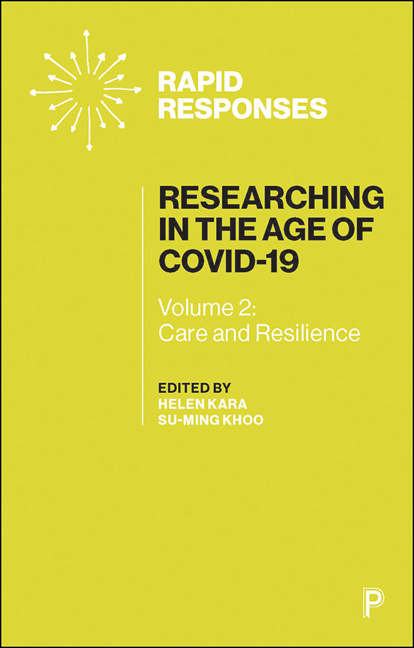5 - Exploring Young People’s Experiences of Growing up Under COVID-19
Published online by Cambridge University Press: 23 March 2021
Summary
Introduction
With many countries still in some form of lockdown, young people stand to be affected by the COVID-19 pandemic in quite specific ways. Children and young people's voices have been notably absent in media coverage about COVID-19. Measures are being proposed, but often with little consideration of the views and perspectives of young people (Fox, 2020). Research highlights the role and value of children in responding to crisis situations (Ray, 2010; Save the Children, 2015); however, little is known about children and young people's roles specifically in major public health crises such as pandemics. This chapter draws on early lessons from an international longitudinal participatory research project involving young people as co-researchers and experts in their own lives (Thomson, 2008; Abebe, 2009). The project seeks to understand the experiences and realities of young people living under COVID-19 according to their own priorities, concerns and terms of reference and puts forward recommendations for how to promote young people's wellbeing, rights and participation during and after the pandemic. The chapter focuses on the challenges (logistical and ethical) of engaging young people from seven countries in participatory action research while working entirely online. It provides an overview of the research methodology and outlines how young people were recruited to the project. At the time of writing (July 2020), this project is ongoing. Thus, we provide several reflections on our experience of designing an international study online and present a number of emerging findings.
The research approach
In keeping with the values of the research team, the study adopts a child and youth-centred, rights-based approach involving young people documenting and making sense of their own views and experiences while also undertaking their own research projects into their own interests, priorities and concerns. The project is informed and framed by three theoretical influences. First, a whole systems approach to inquiry (Burns, 2007) seeks to understand the dynamic interaction between COVID-19 and young people in terms of multiple layers of contextual influence (Bronfenbrenner, 1979) that play out in children's lived realities – their family, peers, community, socio-structural position, political economy and the virtual world.
- Type
- Chapter
- Information
- Researching in the Age of COVID-19Volume II: Care and Resilience, pp. 58 - 67Publisher: Bristol University PressPrint publication year: 2020



